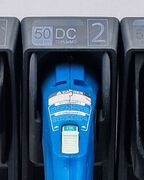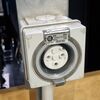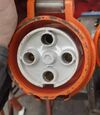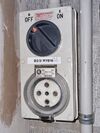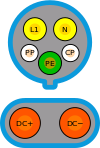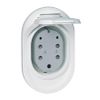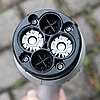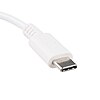Key:socket:*
| Description |
|---|
| Socket properties of a charging station |
| Group: power |
| Used on these elements |
| Useful combination |
| See also |
| Status: in use |
| taginfo: socket:* |
This key may be used anywhere that electric power is supplied for the public or customers. It specifies the type and number of sockets that can be used concurrently. Likely uses are in electric vehicle charging stations, mains hook-ups in campsites, and shore-power connections for boats. It is also often used to indicate mobile phone and other small devices charging interfaces (USB-A, etc.)
How to map
For any relevant object and each socket type, further tag the number socket:<type> and any other attributes socket:<type>:*.
Do not tag socket=*, as it is without meaning or definition.
Tags
| Key | Value | Description | Photo |
|---|---|---|---|
| socket:<type> | Availability of socket type, either specific count as integral numeric (e.g., 2) or non-specific yes. | Availability, preferably count, of the sockets of the specified type that can be used concurrently at that charging station. | |
| socket:<type>:current | Current in amperes, numeric; e.g., 16. | The maximum current that can be sourced from a single socket of the specified type at that charging station. | |
| socket:<type>:output | Power in kilowatts, numeric; e.g., 50. (a unit can be added, 50 kW). | The maximum power that can be sourced from a single socket of the specified type at that charging station. | Output in kW marked on the socket cradle. |
| socket:<type>:voltage | Voltage in volts, numeric, without unit and thousands delimiters; e.g., 400. |
List of socket types
| <type> | Usage | Photo | Symbol | Country | Description | Uses |
|---|---|---|---|---|---|---|
| unknown | The socket type is unknown. Only use this value if no further information is available – a more specific value is preferred. | |||||
| multi | A type of socket that can accept multiple types of plugs. | |||||
| domestic | Domestic | General type of AC power socket for indoor use. Specifics differ per region and implementation. Only use this value if no further information is available – a more specific value is preferred. | ||||
| cee_blue | Industrial | Europe |
IEC 60309 P+N+E, 6h earth pin, blue, 220–240 V AC, 16 A, colloquially known as CEE blue or a caravan socket. Commonly used for power supply in camping sites in Europe. There are similar sockets of different current ratings that are used more rarely. These can be tagged explicitly in a similar way to the CEE red sockets, e.g. cee_blue_32a. |
|||
| cee_red_16a | Industrial | Germany
Poland |
IEC 60309 3P+N+E, 6h earth pin, red, 350–415 V AC, 16, 32, 63, 125 A, colloquially known as CEE red. There are different sizes for each current rating, with those for more current being larger. Plugs and sockets of different current ratings are not compatible. |
|||
| cee_red_32a | Industrial | |||||
| cee_red_63a | Industrial | |||||
| cee_red_125a | Industrial | |||||
| as3123_3pin | Industrial | Australia New Zealand many Pacific Islands Antarctica |
AS/NZS 3123 socket, 250 V AC, 10 A, 20 A, 32 A. 3 pins (single phase, neutral and earth). | |||
| as3123_4pin | Industrial | AS/NZS 3123 socket, 415–500 V AC, 10 A to 200 A. 4 pins (three phase and earth; no neutral). Less common than the 5-pin variant. | ||||
| as3123_5pin | Industrial | AS/NZS 3123 socket, 415–500 V AC, 10 A to 200 A. 5 pins (three phase, earth and neutral). | ||||
| type1 | Car |  Letter B in black hexagon [1] |
USA Canada |
IEC 62196-2 Type 1 or SAE J1772-2009 plug, colloquially known as Yazaki, Level 1: 120 V AC, 16 A; or Level 2: 240 V AC, 80 A. The cable is permanently attached to the charging station and plugged into a lockable receptacle on the vehicle. Commonly used in the USA. Most public charging stations in the US provide Level 2 charging at up to 30 A but some are limited to 16 A. |
||
| Car | USA Canada |
Use type1 instead. The cable is always attached to the charger, so no disambiguation is needed. | ||||
| type1_combo | Car | USA Canada |
IEC 62196-2 Type 1, IEC 62196-3 configuration EE or SAE J1772-2009 combined charging system (CCS) plug, with 2, larger, extra pins for DC charging. | |||
| type2 | Car | Australia EU Iceland Norway UK |
IEC 62196-2 Type 2, or VDE-AR-E 2623-2-2 plug, colloquially known as Mennekes. Common in Europe. May have "AC" labelling to distinguish from Tesla chargers using visually similar set of pins[2]. This tag should be used if there is no cable permanently attached to the charger, but has been used for stations with cable as well. |
|||
| type2_cable | Car |
IEC 62196-2 Type 2, or VDE-AR-E 2623-2-2 plug, colloquially known as Mennekes. Common in Europe. May have "AC" labelling to distinguish from Tesla chargers using visually similar set of pins[3]. This tag should be used if there is a cable permanently attached to the charger. Before the addition of this value (in June 2020), objects will have used the value type2. There is no impediment to any resurvey or update to such tagging. |
||||
| type2_combo | Car | IEC 62196-2 Type 2, IEC 62196-3 configuration FF, or VDE-AR-E 2623-2-2, combined charging system (CCS) plugs, with 2, larger, extra pins for DC charging. The cable is permanently affixed to the charging station and plugged into a receptacle on the vehicle. This tag includes CCS charging at Tesla Supercharger stations. | ||||
| Car | Global | CCS is a standard for different connectors of vehicle charging. "CCS" is not the name of any specific connector, use type1, type1_combo, type2, type2_cable or type2_combo instead. | ||||
| type3a | Car | Letter D in white hexagon [4] | France Italy |
IEC 62196-2 Type 3, or EV Plug Alliance, socket. Two versions widely used. The type3a is the single phase version. | ||
| type3c | Car |  Letter E in white hexagon [5] |
France | IEC 62196-2 Type 3, or EV Plug Alliance, socket. Two versions widely used. The type3c is the 3 phase version. | ||
| Car | France | Don't use. Specify the precise socket: Either type3a or type3c. | ||||
| gb_ac | Car | 
|
China, export markets (Belarus, Russia) | GB/T 20234.2-2015 AC plug, colloquially known as national standard (国标, guó biāo) and slow charge.
Attention: Even though it looks a lot like Type 2, it is the reverse of Type 2. There is tongue piece in the holes of GB plug, and nothing in the holes of Type 2 plug. |
||
| gb_dc | Car | GB/T 20234.3-2023 DC plug, colloquially known as national standard (国标, guó biāo) and fast charge. IEC 62196-3 refers to this as configuration BB. | ||||
| chaoji | Car | GB/T 20234.4-2023 High power DC charging coupler. 1000/1500V, 10-800A. |
||||
| chademo | Car | Japan USA Australia EU Iceland[6] UK Canada |
IEC 62196-2 Type 4, IEC 62196-3 configuration AA, or JEVS G105-1993, colloquially CHAdeMO. The cable is permanently affixed to the charging station and plugged into a lockable receptacle on the vehicle. A Japanese standard that provides fast DC charging not available in the other base IEC 62196-2 types, but likely to be supplanted by the IEC 62196-2 combo connectors. | |||
| nacs | Car | North America (Canada, USA, Mexico), Japan, Korea and Puerto Rica | NACS (North American Charging Standard) plug for AC and DC charging. Formerly the proprietary plug of Tesla, however between May 2023 and February 2024 most North American automakers committed to adopting NACS after it was opened for use by other manufacturers.
Note that the introduction of this tag is part of a proposal to clean up tesla socket tags. |
|||
| tesla_supercharger | Car |
(US/CA/MX)
(EU/AU/NZ/etc - legacy)
(EU/AU/NZ/etc - new)
gb_dc (China) |
Global (but 4 different cables) | Note: It is proposed that this tag is deprecated. See also Tag:amenity=charging_station/Tesla Motors
This tag is somewhat confusing as it represents 4 different DC charging cables: (1) What is now known as NACS in North America (see socket:nacs), (2) Type 2 but setup to allow “DC low” and “DC mid” charging in EU/AU/NZ; now legacy and being phased out (see socket:type2_cable), (3) Type 2 Combo in EU/AU/NZ; new (see socket:type2_combo), and (4) GB/T DC in China (see socket:gb_dc). It is for this reason that it is proposed to stop using this tag. |
||
| tesla_destination | Car | (US/CA/MX)
(EU/AU/NZ/etc)
gb_ac (China) |
Global (but 3 different cables) | Note: It is proposed that this tag is deprecated.
This tag is somewhat confusing as it represents 3 different AC charging cables: (1) What is now known as NACS in North America (see socket:nacs), (2) Type 2 charging in EU/AU/NZ (see socket:type2_cable), and (3) GB/T AC in China (see socket:gb_dc). It is for this reason that it is proposed to stop using this tag. |
||
| tesla_roadster | Car | Tesla Roadster plug. Available at some public charging stations, but generally not commercially. | ||||
| j3105-1 | Medium & Heavy Vehicles | |||||
| j3105-2 | Medium & Heavy Vehicles | |||||
| magne_charge | External link | |||||
| ropd | Bicycle | Germany Czech Republic |
RoPD® - Rosenberger Power Data Connectors. This plug system is currently (2020-03) installed in the charging stations of "bike-energy". It is mainly used for charging bicycles. | |||
| bosch_3pin | Bicycle | Bosch charging connector. It is mainly used for charging bicycles. This key is used for the 3-pin variant, typically outputting 36 V and 4 A. | ||||
| bosch_5pin | Bicycle | Bosch charging connector. It is mainly used for charging bicycles. This key is used for the 5-pin variant, typically outputting 36 V and 6 A. | ||||
| shimano_steps_5pin | Bicycle | Shimano Steps charging connector. It is mainly used for charging bicycles, typically outputting 40 V and 4.4 A (or 42 V and 4 A). | ||||
| xlr_3pin_cable | Bicycle | XLR charging connector. It is mainly used for charging bicycles. This key is used for the 3-pin variant. | ||||
| typee | Domestic | France Belgium Monaco Morocco Tunisia Poland Czech Republic Slovakia |
Domestic socket used in France, Belgium, Monaco, Morocco, Tunisia, Poland, Czech Republic, Slovakia. IEC type E, or CEE 7/5 socket (taking a CEE 7/6 or CEE 7/7 plug), 220–230 V AC, 16 A. Can be compatible with schuko by additionally having connectors at the sides. | |||
| typek | Domestic | Denmark Greenland |
IEC type K domestic socket | |||
| typeL | Domestic | Italy Chile |
Domestic socket. Often combined with other connector types in one socket. | |||
| nema_5_15 | Domestic | Americas Asia |
IEC type B or NEMA 5-15R receptacle, and NEMA 5-20R receptacle, accepting NEMA 5-15P plugs, 110–127 V AC, 15 A. Commonly used in the Americas and Asia. | |||
| nema_5_20 | Domestic | USA | Similar in appearance to NEMA-5-15, but has a T-shaped socket on one side, and can supply a higher current. Compatible with NEMA 5-15P plugs. Many older ChargePoint stations have one of these behind the locking front panel. | |||
| nema_14_30 | Domestic | USA | NEMA 14-30 2P+N+E, 208 V or 240 V AC, 30 A. L-shaped neutral blade. | |||
| nema_14_50 | Domestic | NEMA 14-50 2P+N+E AC, 208 V or 240 V, 50 A. Straight neutral blade. Offered in some places. | ||||
| schuko | Domestic | Germany Spain Algeria Mozambique Russia Mongolia Iran Afghanistan Korea Indonesia |
IEC type F, or CEE 7/3 socket (taking a CEE 7/4 plug), also known as Schuko (or Siemens in Italy), 220–240 V AC, 16 A. Developed in Germany, used in most European countries and some in Africa and Asia. Can be compatible with typee by additionally having a pin/hole on the front side. | |||
| bs1363 | Domestic | UK Commonwealth |
IEC type G, or BS 1363 socket, 220–240 V AC, 13 A. Used in UK and many Commonwealth country domestic premises. | |||
| as3112 | Domestic | Australia New Zealand many Pacific Islands Antarctica |
IEC type I, or AS/NZS 3112 socket, 220–240 V AC, 10 A, 15 A (longer earth pin) | |||
| gb1002 | Domestic | Mainland China | IEC type I, 250V AC, 10/16A; IEC type A, 250V AC, 10A. The latest standard is GB 1002-2024, and the old GB/T 1002-2008 socket is shown in the picture. | |||
| sev1011_t13 | Domestic | Switzerland | SEV 1011 Type 13 socket, 230 V AC, 10 A. Also known as IEC type J. | |||
| sev1011_t15 | Domestic | Switzerland | SEV 1011 Type 15 socket, 230/400 V AC, 10 A. | |||
| sev1011_t23 | Domestic | Switzerland | SEV 1011 Type 23 socket, 230 V AC, 16 A (rectangular pins). | |||
| sev1011_t25 | Domestic | Switzerland | SEV 1011 Type 25 socket, 230/400 V AC, 16 A (rectangular pins). | |||
| powerlock | Industrial | |||||
| camlock | Industrial | |||||
| device:USB-A | Devices | USB-A socket to plug in charger cable e.g. for mobile phones | ||||
| device:micro-b | Devices | A USB-B micro connector on a cable | ||||
| device:USB-C | Devices | USB-C socket to plug in charger cable e.g. for mobile phones and laptops | ||||
| device:USB-C_cable | Devices | USB-C cable to plug directly into a device | ||||
| device:lightning | Devices | Apple Lightning socket to plug in charger cable for Apple mobile phones and laptops | ||||
| device:qi-wireless | Devices | Qi inductive charging wireless power pad e.g. for mobile phones |
Maps
The MapComplete charging theme offers support for plugtypes, voltage outputs, ... and keeps a list of the charging types, typical outputs and icons.
References
- ↑ https://aver.ro/2021/03/22/evs-and-charging-stations-new-european-labeling/
- ↑ https://github.com/streetcomplete/StreetComplete/issues/903#issuecomment-1005771138
- ↑ https://github.com/streetcomplete/StreetComplete/issues/903#issuecomment-1005771138
- ↑ https://www.recharge-electrique.com/vehicules-electriques-cest-quoi-letiquetage-obligatoire/
- ↑ https://aver.ro/2021/03/22/evs-and-charging-stations-new-european-labeling/
- ↑ https://github.com/streetcomplete/StreetComplete/issues/903#issuecomment-1005771138
